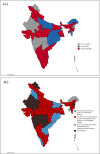A review of climate change and cardiovascular diseases in the Indian policy context
- PMID: 39185584
- PMCID: PMC11562124
- DOI: 10.1093/heapol/czae076
A review of climate change and cardiovascular diseases in the Indian policy context
Abstract
There is growing evidence that climate change adversely affects human health. Multiple diseases are sensitive to climate change, including cardiovascular diseases (CVDs), which are also the leading cause of death globally. Countries such as India face a compounded challenge, with a growing burden of CVDs and a high vulnerability to climate change, requiring a co-ordinated, multi-sectoral response. In this framework synthesis, we analysed whether and how CVDs are addressed with respect to climate change in the Indian policy space. We identified 10 relevant national-level policies, which were analysed using the framework method. Our analytical framework consisted of four themes: (1) political commitment; (2) health information systems; (3) capacity building; and (4) cross-sectoral actions. Additionally, we analysed a subset of these policies and 29 state-level climate change and health action plans using content analysis to identify health priorities. Our analyses revealed a political commitment in addressing the health impacts of climate change; however, CVDs were poorly contextualized with most of the efforts focusing on vector-borne and other communicable diseases, despite their recognized burden. Heat-related illnesses and cardiopulmonary diseases were also focused on but failed to encompass the most climate-sensitive aspects. CVDs are insufficiently addressed in the existing surveillance systems, despite being mentioned in several policies and interventions, including emergency preparedness in hospitals and cross-sectoral actions. CVDs are mentioned as a separate section in only a small number of state-level plans, several of which need an impetus to complete and include CVD-specific sections. We also found several climate-health policies for specific diseases, albeit not for CVDs. This study identified important gaps in India's disease-specific climate change response and might aid policymakers in strengthening future versions of these policies and boost research and context-specific interventions on climate change and CVDs.
Keywords: Climate change; cardiovascular diseases; environmental health policy; policy; policy analysis.
© The Author(s) 2024. Published by Oxford University Press in association with The London School of Hygiene and Tropical Medicine.
Conflict of interest statement
None declared.
Figures





References
-
- Benmarhnia T, Bailey Z, Kaiser D et al. 2016. A difference-in-differences approach to assess the effect of a heat action plan on heat-related mortality, and differences in effectiveness according to sex, age, and socioeconomic status (Montreal, Quebec). Environmental Health Perspectives 124: 1694–9. - PMC - PubMed
-
- Bhatia M, Dixit P, Kumar M, Dwivedi LK. 2021. Impending epidemic of cardiovascular diseases among lower socioeconomic groups in India. The Lancet Healthy Longevity 2: e314–5. - PubMed
Publication types
MeSH terms
Grants and funding
LinkOut - more resources
Full Text Sources
Medical

